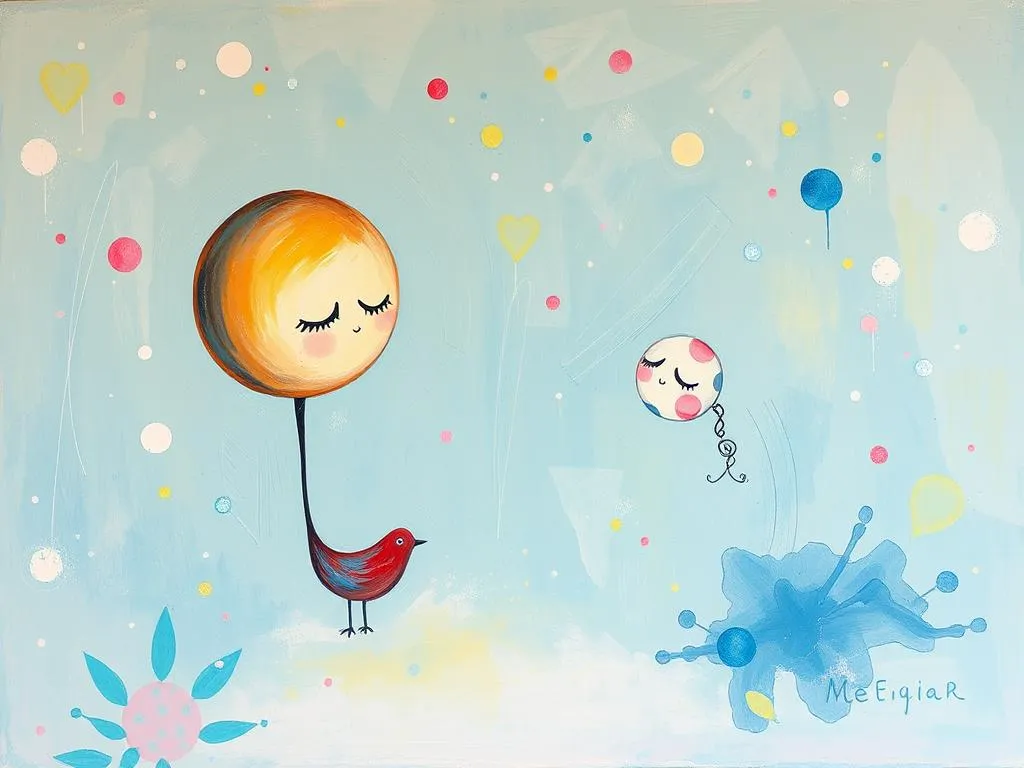
Have you ever woken up from a dream and felt strangely detached from the experience? Maybe you were running through a beautiful landscape, yet all you could feel was an unsettling emptiness. Dreams can often feel vivid and surreal, but sometimes they lack the emotional weight we expect. This phenomenon—dreaming without feeling—can leave us scratching our heads, wondering what our subconscious is trying to communicate.
Understanding the significance of these emotionally barren dreams can provide clarity and insight into our waking lives. Just like a puzzle missing a few pieces, these dreams can reveal deeper layers of our psyche, hinting at unresolved issues or feelings we may be avoiding. Let’s explore the symbolism behind this enigmatic aspect of dreaming, analyze specific experiences, and uncover paths for personal growth.
Dreamscapes of Detachment: The Symbolism Behind Emotionless Dreams
In the realm of dreams, symbols often serve as metaphors for our inner thoughts and feelings. When we experience dreams devoid of emotion, it can signify several underlying issues. Let’s delve into some common symbols associated with this phenomenon.
-
Empty Spaces: Dreaming of vast, empty landscapes—like deserted cities or barren fields—can represent feelings of isolation or disconnection in your waking life. These spaces might indicate a longing for connection or an escape from reality.
-
Muted Colors: When your dreams lack vibrancy, it might symbolize stagnation or a lack of enthusiasm in your life. Colors in dreams often reflect our emotional states. A muted palette could suggest that you’re feeling uninspired or overwhelmed by routine.
-
Mechanical Actions: If you find yourself performing tasks in dreams without any sense of fulfillment, it could indicate a sense of being stuck in a monotonous cycle. This can happen when we feel like we’re merely going through the motions without any emotional investment in what we do.
-
Faceless Figures: Encountering faceless individuals in your dreams can be disconcerting. These figures may represent parts of yourself that you haven’t fully acknowledged. The absence of faces can symbolize unprocessed emotions or aspects of your identity that are still developing.
-
Silence: Dreams filled with silence or an absence of sound can evoke feelings of numbness. This can signify that you might be avoiding confronting certain emotions in your life, leading to a disconnect between your emotional experiences and your consciousness.
Recognizing these symbols can provide valuable insights into the emotional landscape of your waking life. By paying attention to the nuances of your dreams, you can begin to unravel the meanings buried beneath the surface.
Silent Narratives: Scenarios of Emotionless Dreams
To better understand how these themes manifest in real-life experiences, let’s explore some scenarios that illustrate the phenomenon of feeling no emotion in dreams. Each scenario offers an opportunity to reflect on the implications and insights that might arise.
-
The Job Interview: Imagine you’re at a job interview, dressed impeccably and prepared with answers. Yet, during the entire experience, you feel strangely disconnected—like you’re watching a movie rather than participating. This scenario might reflect anxiety about your career. You could be worried about not feeling genuinely excited about your path, indicating a need to reassess your goals and passions.
-
The Lost Child: In another dream, you’re searching for a lost child in a crowded park. You know you should feel panic or fear, yet a cold calmness envelops you. This scenario could symbolize a fear of responsibility or a sense of detachment from your obligations. It might suggest that you’re avoiding confronting certain responsibilities or emotional ties in your life.
-
The Wedding Day: Picture yourself at your wedding, surrounded by friends and family, yet you feel as if you’re merely an observer. The joy of the day feels muted. This could signify commitment issues or a struggle with personal relationships. Perhaps there are unresolved feelings about intimacy or fear of vulnerability that need addressing.
-
The Endless Hallway: You find yourself wandering an endless hallway, walking past several doors, each one promising new adventures. Strangely, there’s no excitement or curiosity—just an overwhelming sense of monotony. Here, the dream may reflect your current life state, suggesting that your routine has become stale and you need to seek out new experiences or challenges to reinvigorate your passions.
-
The Floating Object: In a surreal twist, you dream of floating objects—perhaps books or furniture—drifting lazily through your environment. Although it’s an unusual sight, you feel no wonder or curiosity. This dream could represent feelings of detachment from your surroundings or a need to engage more deeply with the world around you. It might be a reminder to seek out activities that spark joy and connection.
These scenarios illustrate the complexities of emotional detachment in dreams, offering a window into the hidden facets of your psyche. Each narrative can serve as a catalyst for introspection, urging you to examine your waking life and how you engage with your feelings.
Awakening to Change: Embracing Personal Growth
Now that we’ve explored the symbols and scenarios that characterize emotionless dreams, it’s time to focus on how you can harness these insights for personal growth. Here are a few practical steps to help you navigate your emotional landscape and awaken to a more fulfilling existence.
-
Reflect on Your Emotions: Begin by journaling about your dreams and the feelings (or lack thereof) they evoke. What themes emerge? What emotions do you notice in your waking life? This practice can help you connect the dots between your dreams and your emotional reality.
-
Identify Areas of Stagnation: Take a closer look at aspects of your life that feel monotonous or unfulfilling. Are there activities or relationships that have lost their spark? Consider setting new goals or trying new hobbies to reignite your passion.
-
Engage with Your Emotions: Make a conscious effort to engage with your feelings, even the uncomfortable ones. Allow yourself to sit with emotions without judgment. This can be done through mindfulness practices, therapy, or creative expressions like art or writing.
-
Seek Connection: If your dreams reflect feelings of isolation, think about ways to foster connections with others. Reach out to friends or family, join a community group, or explore new social activities. Building meaningful relationships can help ground you emotionally.
-
Embrace Change: Change can be daunting, but it often leads to growth. If your dreams signal a need for transformation, consider what changes you can embrace—whether that’s in your career, relationships, or personal habits. What can you do today to move toward a more fulfilling life?
By taking these steps, you can begin to bridge the gap between your dreams and your waking reality, transforming the emptiness of emotionless dreams into a rich tapestry of self-discovery and fulfillment.
As you reflect on the significance of feeling no emotion in dreams, remember that they are not just fleeting narratives, but intricate reflections of your inner world. Acknowledge the messages they carry and approach your emotions with curiosity and compassion. In doing so, you may find that the journey into your subconscious leads to profound insights that inspire you to live a more authentic and vibrant life.
In the silence of our dreams, we may find the loudest echoes of our deepest truths.







